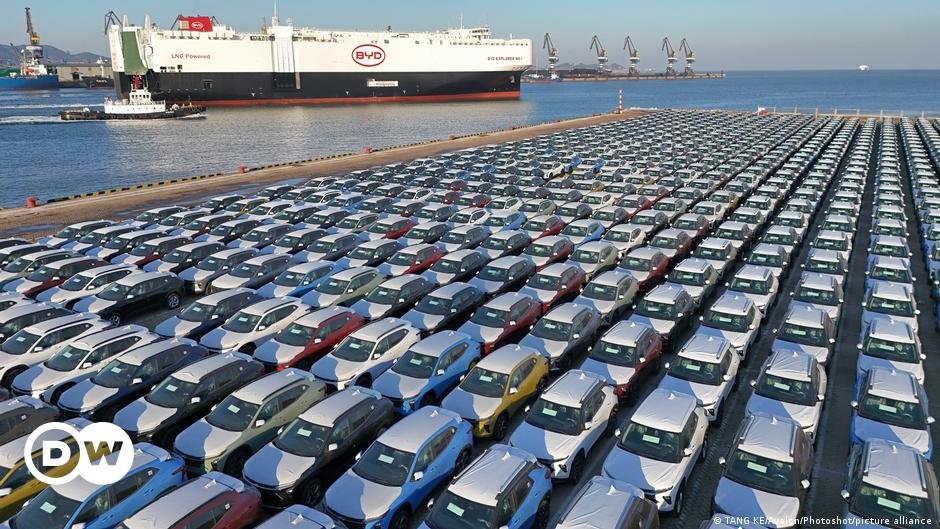Germans invented cars — and by the time Carl Benz patented the “vehicle powered by a gas engine” in 1886, he already knew that selling them would become an international business. His company‘s first customer was the sultan of Morocco, Hassan I. And his first car reached China only a few years later, in 1901, as a birthday gift to the mother of the reigning emperor.
However, Carl Benz had no way of knowing that 120 years later China’s domestic automobile industry would grow to become the biggest rival of German car manufacturers. The two countries cooperated closely for decades, with Volkswagen entering a joint venture to produce cars in Shanghai in 1983 and German cars ruling the streets of Chinese cities for decades to come.
Even today, German brands are making massive profits in the Chinese market. And many agree with former German President and IMF Chairman Horst Köhler, who recently went viral in China for an interview in which he said, “both of us would be stupid — China would be stupid and Germany would be stupid — if we didn’t have a good relationship.”
“We need to work together and make sure the global economy is booming,” Köhler told a Chinese videoblogger.
German carmakers angry over EU tariffs
But the European Commission seems to have a different perspective. Just days after the EU elections, the bloc’s executive branch announced punitive tariffs of up to 38.1% on Chinese electric vehicles (EVs), despite criticism from European carmakers and the German government.
EU officials say the move was prompted by China subsidizing its own companies. And as steep as the EU tariffs are, they are still much lower than the 100% tariffs recently announced by the US.
For Hidlegard Müller, the head of Germany’s VDA carmakers’ association, the EU tariffs are “a step away from global cooperation.” The CEO of BMW, Oliver Zipse, said the European Commission was “harming European companies and European interests.” Ola Källenius, the CEO of Merzedes-Benz, which traces its lineage back more than a century to Carl Benz, warned that Germany was an export nation with no need for “escalating barriers to trade.”
German Economy Minister Robert Habeck also urged negotiations and warned against a “tariff race.”
Meanwhile, Beijing has expressed displeasure. On Wednesday evening, China’s Trade Ministry pledged to take all necessary steps to protect the interests of Chinese carmakers. Officials dismissed the EU decision as unfounded and “pure protectionism,” claiming accusations of subsidies were “invented and artificially inflated.”
The ministry also said that affordable electric cars were crucial to allowing the EU to meet its carbon-cutting emissions goals.
Green transition ‘in jeopardy’
VDA chief Hidlegard Müller echoed that sentiment. “We need China to solve global issues,” she said. “China plays a key role in the successful transformation towards EVs and digitalization. A trade conflict would put this transformation in jeopardy.”
Economists have long been aware of China intentionally boosting certain industrial sectors to flood the market and drive down global prices.
There is no doubt that Beijing gives massive subsidies to its companies, said DW’s economy expert Lars Halter.
“However, it’s impossible to give specifics on the amount of the subsides,” he added. “It is not merely a case of the government transferring money to the companies. They also make sure companies get access to cheaper batteries or raw materials, or to cheap loans.”
Clash of the export titans
German politician Walter Döring once served as economy minister and vice-premier in the German state of Baden-Württemberg. He now heads the Academy of German World Market Leaders in the city of Schwäbisch Hall. Baden-Württemberg is the home of two major carmakers — Porsche and Mercedes — along with many smaller car-related companies.
“For many years, Germany was the world’s export champion,” Döring said at a conference in Stuttgart last week. “We were always very proud to offer our products and services to the whole world. Nobody ever accused us of overproduction.”
“Today we have a competition of world export champions,” Döring added.
When it comes to cars, China is the reigning 2023 export champion, ahead of Japan and Germany. But China’s reach on Germany’s home turf is not exactly impressive. Last year, China’s two top electric carmakers, BYD and NIO, sold fewer than 5,400 electric cars combined in the EU country.
Who is most likely to be hit by China’s response?
At the same time, the hype around electric cars seems to be dying down in Europe. For German economist Ferdinand Dudenhöffer, this lack of interest has been manufactured by politicians.
“The electric car is the future,” he said. “Our politicians have stupidly lost interest in the future.”
This waning enthusiasm is perhaps reflected in EU member states lowering their incentives for EV purchases and the “general attitude among politicians that internal combustion cars once again have a future.”
In the end, even if a trade war erupts, “Beijing will not impose tariffs on EU products that it still needs,” said Jakob Gunter from the Berlin-based Mercator Institute for China Studies (MERICS).
“This includes machines, valuable industrial goods, chemicals, medical technology and other products. It is also not likely to target the big European manufacturers that invest heavily into China, create jobs, pay taxes and contribute to economic growth,” he added.
Instead, the companies paying the price would most likely be those selling “agricultural products, food and beverages that customers in China can do without” or that China already produces in sufficient quantities.
This article was translated from German by Darko Janjevic.
Edited by: Keith Walker
“Decoding China” is a DW series that examines Chinese positions and arguments on current international issues from a critical German and European perspective.





